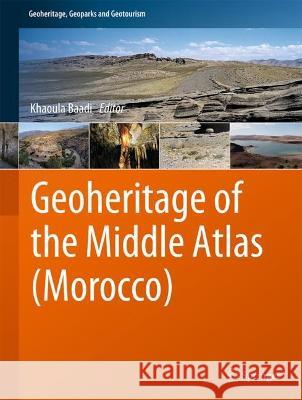Geoheritage of the Middle Atlas (Morocco) » książka
Geoheritage of the Middle Atlas (Morocco)
ISBN-13: 9783031270727 / Angielski
Geoheritage of the Middle Atlas (Morocco)
ISBN-13: 9783031270727 / Angielski
(netto: 611,96 VAT: 5%)
Najniższa cena z 30 dni: 578,30
ok. 16-18 dni roboczych.
Darmowa dostawa!
This book is a condensed summary of a broad spectrum of the geological heritage of the Middle Atlas. It has the particularity of proposing an in-depth synthesis and a critical review of the geoheritage of the region. The book addresses the issues related to geoheritage and methodologies for the selection, inventory, assessment and preservation of geosites. It reviews the state of the art of geoheritage in Morocco, particularly in the Middle Atlas, in order to identify geosites with rare and unique geological features. The book presents a detailed study of lithostratigraphic and sedimentological heritage as geosites witnessing at different spatial and temporal scales the evolution and the stratigraphic, sedimentological and paleogeographic history of the Middle Atlas range. It also presents the paleontological heritage of vertebrates by reviewing the discoveries of paleontological sites and their risks in order to present its conservation plans. It also addresses the hydric and fluvial heritage by presenting the potential of water resources and the impact of climate change on the latter. Furthermore, it highlights the karst heritage by exposing an inventory of exo- and endokarst geosites in order to emphasize some unique sites on a national and African scale as well as revealing the underground biodiversity related to this heritage. Finally, it proposes a presentation of the volcanic heritage in order to assess the volcanic geosites that testify to the strombolian, phreatomagmatic and Hawaiian dynamism of the region.The book is mainly intended for researchers, geologists and specialists of the Moroccan Middle Atlas region wishing to acquire a broad multidisciplinary or even transdisciplinary knowledge. It will also be accessible to a non-initiated public, interested in the richness of the Moroccan geoheritage, as well as to Moroccan territorial authorities (High Commission for Water and Forests, Ministry of Tourism, National Institute of Archaeology and Heritage Sciences, etc.) who can benefit from it in the perspective of their strategies of preservation of the national geological heritage. This work will be an example for geoscientists, on an African scale, of a valorization of territorial geological heritage.











